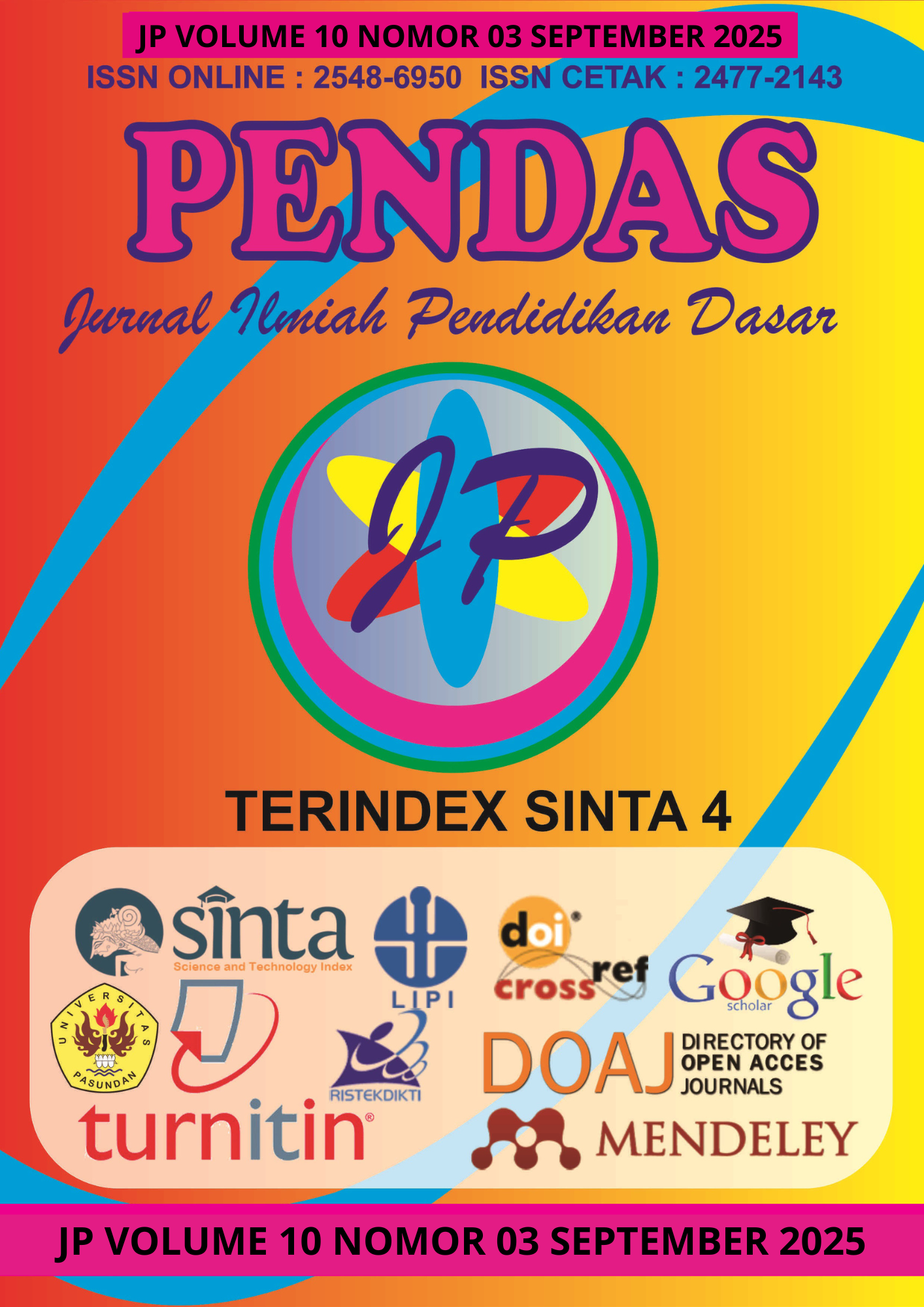IMPLEMENTASI PENDEKATAN PEMBELAJARAN MENDALAM (DEEP LEARNING) DALAM MENINGKATKAN PEMAHAMAN KONSEP SISWA DI SEKOLAH DASAR
DOI:
https://doi.org/10.23969/jp.v10i3.27960Keywords:
joyful learning, meaningful learning, mindful learning, understanding concepts, deep learningAbstract
Elementary education faces transformative challenges in the 21st century, where learning practices are not merely about knowledge transfer but require the development of deep conceptual understanding in students. This research aims to obtain information/overview, identify, and analyze the impact of implementing a deep learning approach in enhancing students' conceptual understanding in elementary schools. The research subjects consisted of fifth-grade teachers and students in elementary schools. This study used a qualitative case study approach with data collection techniques conducted through participant observation, in-depth interviews, and documentation studies. The implementation stages were based on the deep learning process: understanding, applying, and reflecting. The results show that the implementation of a deep learning approach, which includes indicators of mindful learning, meaningful learning, and joyful learning, has a positive impact on improving students' conceptual understanding in IPAS (Science, Social Studies, and Arts) learning. Due to limitations in the research subjects, future researchers are advised to expand the scope of subjects and subjects, and to conduct further quantitative research to statistically test the effectiveness of deep learning on improving student learning outcomes.
Downloads
References
Akademik, N., Pendidikan, M., & Semua, B. U. (n.d.). Kementerian Pendidikan Dasar dan Menengah Republik Indonesia Pembelajaran Mendalam.
Analisis Keparlemenan Badan Keahlian Setjen DPR Bidang Kesra, P. R., & Indahri Analis Legislatif Ahli Madya, Y. (n.d.). Isu Sepekan. https://pusaka.dpr.go.id
Aryanto, S., Meliyanti, M., Amelia, D., Maharbid, D. A., Gumala, Y., & Gildore, P. J. E. (2025). Pembelajaran Literasi Dan Numerasi Melalui Deep Learning: Pendekatan Transformasional di Sekolah Dasar. Journal of Professional Elementary Education, 4(1), 49–57. https://doi.org/https://doi.org/10.46306/jpee.v1i1
Fullan, M., & Langworthy, M. (2014). A rich seam: How new pedagogies find deep learning.
Gifari, M. K., Gunadi, R. A., & Dewi, R. (2025). Mindful, Meaningful, dan Joyful Learning di PAUD: Sebuah Tinjauan Literatur Sistematis. Prosiding Seminar Nasional Pendidikan FKIP Universitas Lampung, 284–296.
Kristiana, D., & Jumadi, J. (2022). Menciptakan Joyfull Learning Melalui Loose Part Play Pada Anak Usia Dini. Jurnal Dimensi Pendidikan Dan Pembelajaran, 10(2), 191–196.
Mutawadia, M., Jawil, J., & Al Farisi, S. (2023). Penerapan Metode Pembelajaran Mendalam Sebagai Upaya Pembentukan Karakter Siswa. Journal of Instructional and Development Researches, 3(6), 279–284.
Rui, L., Mohamad Nasri, N., & Mahmud, S. N. D. (2024). The Role of Self-directed Learning in Promoting Deep Learning Processes: A Systematic Literature Review. F1000Research, 13, 761. https://doi.org/10.12688/f1000research.150612.1
Sufiani, S., & Marzuki, M. (2021). Joyful Learning: Strategi Alternatif Menuju Pembelajaran Menyenangkan. Zawiyah: Jurnal Pemikiran Islam, 7 (1), 121.
Sutik, S., Masitoh, S., & Mariono, A. (2022). Webbed Model Integrated Learning on Problem Solving and Self-Regulation Skills for PAUD Student in Mojokerto. Srawung: Journal of Social Sciences and Humanities, 61–67.
Weng, C., Chen, C., & Ai, X. (2023). A pedagogical study on promoting students’ deep learning through design-based learning. International Journal of Technology and Design Education, 33(4), 1653–1674.
Downloads
Published
Issue
Section
License
Copyright (c) 2025 Pendas : Jurnal Ilmiah Pendidikan Dasar

This work is licensed under a Creative Commons Attribution 4.0 International License.



















